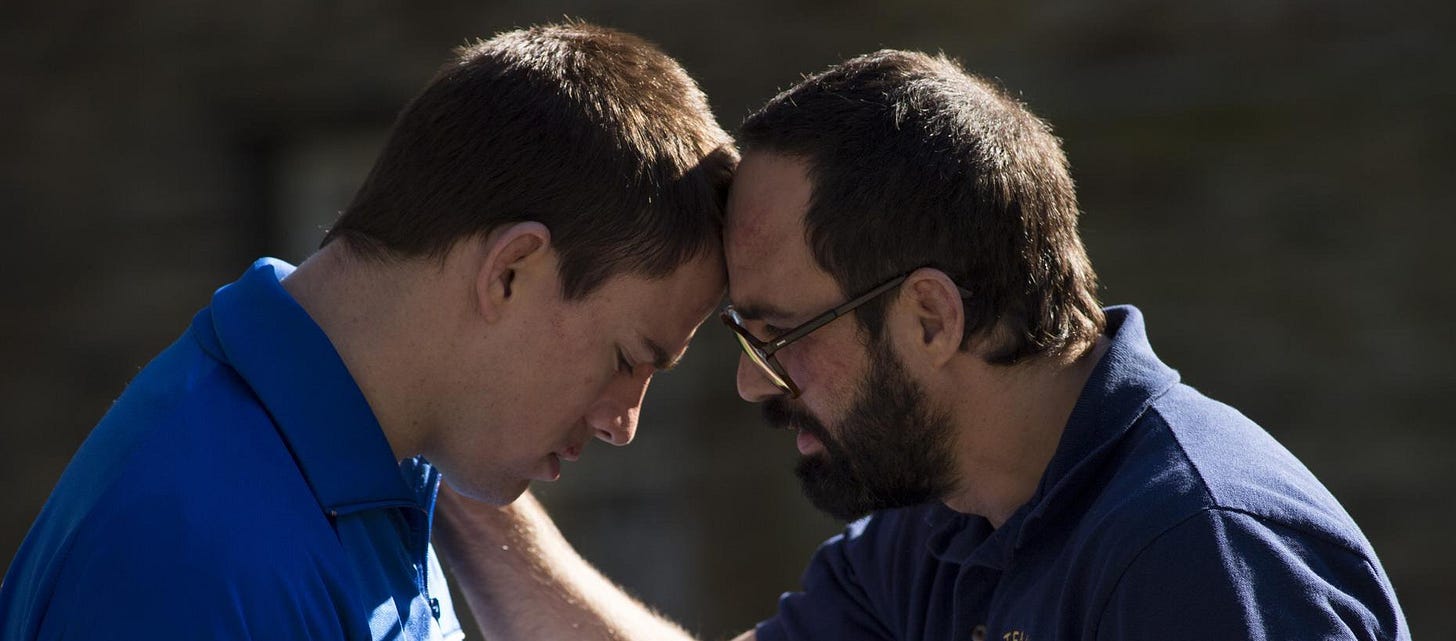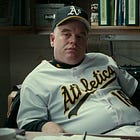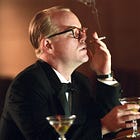Foxcatcher (2014) Film to Documentary Comparison
“You are not alone in this. I am your brother and I love you”

From a simple white font on a dark black background and “The following is based on a true story”, we cut to both black and white and colour cine film footage of generations past and the landed gentry of the du Pont family and particularly a matriarchal figure riding one of the family horses as another is paraded and resplendent in a horse rug noting “Foxcatcher Farm”. As the first stirrings of Rob Simonsen’s gentle, one note piano score begins so “FOXCATCHER” is displayed before a fade to black and immediately to a wrestler vigorously working out his moves on a training doll alone in a “Wexler” branded gymnasium, to the same wrestler, all alone in his car as he drapes his Olympic gold medal around his neck in a school car park. Next we find this wrestler, alone once more, rehearsing his coming speech in a small office inside the school before again, all alone and now behind a lectern inside a small gymnasium, sports or assembly hall, deep within the school.
The wrestler is “Mark Schultz” (Channing Tatum).
“Hello, and thank you for giving me the opportunity to talk to you today” he begins, as the camera turns to face the audience of young children of perhaps 10–11 years of age and a school hall only half full. “My name is Mark Schultz. I want to talk to you about America. I want to tell you why I wrestle”. Mark pauses to hold up his gold medal and after cutting to a watching if not entirely enraptured audience “This is an Olympic gold medal. I won this 3 years ago at the 23rd Olympic Games in Los Angeles, California. This is more than some piece of metal. It’s about what the metal represents. The virtues it requires to attain it”. Here director Bennett Miller displays a fuller shot of the school hall only half filled, Mark a distant, singular figure on stage as we cut to a school secretary completing a cheque for $20.00 and asking if his name is “Dave or David”, Mark corrects her, stating that he’s here in place of his brother and “we both won golds”. Mark cuts a downcast figure as he awaits the completion of the cheque and similarly when seen next, alone with everybody as he waits in line for a fast food breakfast he hungrily demolishes sat alone, again, inside his car.
Returning home to a somewhat, outwardly at least, ramshackle building, his apartment inside is cleaner if sparsely furnished and after fishing through a black bin liner, Mark finds the display case for his gold medal before placing the medal in its presentation case in pride of place in the middle of his wrestling trophies, and beside a framed picture of both himself and brother Dave smiling with their 1984 Olympic gold medals. After cutting to Mark crumbling some dry noodles in a bowl we quickly cut to him, alone once more, slowly eating the now cooked noodles as he looks at a small framed painting of a cavalry charge during the American Civil War and now to his arrival in the changing rooms of his gymnasium, the room falling into a hushed silence as he makes his way to his locker. Now entering the gymnasium or practice area, Mark slowly conducts a series of warm up routines as the camera is drawn to the office area and his brother Dave surrounded by a gaggle of older men dressed in suits. Spotting his brother’s arrival in the gymnasium, Dave now leaves the office with four members of the USA wrestling committee to introduce them to Mark who merely shrugs his shoulders with indifference and barely returns their greetings before Dave returns alone to begin their joint practice session.
Mark continues his somewhat indifferent attitude even towards his smiling brother as he barely returns his cheery greeting of “Hey Buddy!” before asking his brother coldly if he’s been ringing him at home and “leaving hang ups” without talking to him. Laughing off the suggestion, Dave replies that he isn’t before the brothers entangle themselves in a joint warm up before beginning to grapple for the first time. Sullen, distant and unhappy, Mark is constantly and easily outwitted by his older brother in their tussles as Dave repeatedly coaches him to “keep your hips in” and yet, Dave consistently takes down his younger brother until, angry, bitterly angry, Mark begins slapping his older brother at the start of their next practice session before deliberately headbutting him as they come together. The session so far has been growing particularly physical and now with a bloodied nose and blood covering the upper part of his wrestling vest, Dave responds to his younger brother’s slaps by being equally competitive and physical before once more getting the better of Mark, taking him down, and placing him in a wrestling hold from which Mark cannot escape. The scene ends with a close-up on Mark looking bitterly lost, sportingly defeated, and on the edge of despair.
Driving his younger brother home in the dark of the night, Dave confirms the USA wrestling committee have offered him a coaching role in Colorado and as Mark begins to exit the car he asks his brother for a hug. Mark leans in but barely hugs or receives one from his brother and after leaving the car, Dave sits in his car clearly worried for his younger brother. We cut to Mark inside his bathroom, staring at his reflection in a small mirror. The reflection, at first, is deliberately blurred, but clears as Mark first taps a large bruise on his left cheek before repeatedly and violently tapping harder and harder on the already highly inflamed area before staring at his reflection and turning out the light. Playing a Gameboy now and once again, all alone, the telephone rings and despite his hesitancy of expecting yet another “hang up”, Mark answers, and after confirming that he is indeed Mark Shultz, the Olympic gold medal winner, the caller continues:
“I’m calling on behalf of Mr John E du Pont. He has been anxious to get in touch with you”. Unaware of who John du Pont is, Mark asks for further clarification as to who his mystery caller is calling him about. “John E du Pont of the du Pont family. Mr du Pont asked that you’d consider taking a day out of training to come out to Foxcatcher Farms, so you men can meet face-to-face”. Mark, naturally, asks what this meeting would be about. “He’d like to discuss it with you in person in Pennsylvania. If I may, I’d like to make travel arrangements for you Mr Schultz, first class of course”.
“Who’d you say again?” Mark asks incredulously.
“John E du Pont of the du Pont family” comes the simple, straight forward reply.
Departing from the norm of my usual, but still spoiler free film reviews, rather than a sketched outline and my appreciation of the film, here are the three protagonists as I perceived them in both the 2014 film and the Team Foxcatcher documentary released two years later:
“John E du Pont” (Steve Carell) The joy, or otherwise, of Carell’s performance of this horribly distasteful and despicable man is his presumably deliberate staccato way of speaking and also by looking down his nose when doing so. This can be taken literally and indeed figuratively as this immensely privileged yet awkward outsider is pictured in the film as collecting and disposing of people at will and of a man child who has everything yet still has to bask in the glory of others as I saw him playing a continual game of pretence. He may wish to be known as “Eagle” or “Golden Eagle” and regarded as a patriot, a philanthropist, ornithologist, author and world explorer, but he’s nobody’s “coach” and despite a childhood without any friends (as explored more fully in the documentary) he’s nobody’s friend either. Whilst the documentary skirts around the edges of his fixation and desperation for love and approval from his mother, the film reinforces this several times, highlighted during a painfully embarrassing and wince inducing training session whereby director Bennett Miller also chose to demonstrate the growing disconnect between a deluded “mentor” and the real star of his life, this film, and the documentary that followed it. Talking of which and indeed delusion, here is where the documentary comes into its own, with various interviewees describing John as buying friends, being an eccentric loner with two sides to his personality that grew more and more disconnected from reality, drawing his gun on wrestlers, a cocaine abuser, and as one interviewee described John as seeing himself as a “Dalai Lama” type figure, John himself is recorded on telephone conversations with the police as a “Head of State” with “Diplomatic Papers” as an “International War” rages all around him.
“Dave Schultz” (Mark Ruffalo) I found Dave to be fairly represented across both film and documentary as a soft hearted, forever smiling, attentive older brother, husband and father of two young children and Ruffalo’s performance is a true gem. Whereas the film lays great score as to Dave’s 1984 Olympic gold medal triumph and his progression into coaching, the documentary rightly notes the fuller career achievements of this “hippie wrestler” who not only won Olympic gold but World Championship gold too as well as seven American National championships and although he’s seen on film admitting to chasing gold at the 1991 World Championships and the 1992 Olympic Games “and then quit before my hair falls out”, Dave is the archetypal joker of the pack, forever laughing and joking and a real human heart of goodness beating out of his chest.
“Mark Schultz” (Channing Tatum) Mark is shown as our central protagonist in the film and a man in 1987 almost constantly alone and a polar opposite of his older brother. Sullen. Broken. Angry. Unloved. Underappreciated. Mark cuts a lonely stranger even in John du Pont’s strange world and although his head and indeed his world had been turned by the attention and affection of the multi-millionaire he addresses constantly as “sir”, there’s an underbelly of darkness that will seemingly never leave him. Mark is entirely absent from the documentary as the timeline runs from Dave joining the Foxcatcher team and after Mark had long since left the farm and facilities. In the film, Mark and Dave are depicted training together at the farm and after John du Pont’s repeated insistence that Mark persuade his brother to join them. Dave is seen in the film as being reluctant to give up his job and move his family to the farm and when he eventually does so, Mark is already on the verge of leaving (and utter despair) hence the brothers never spent any joint time together at the farm and is one of the many historical inaccuracies in the film.
I’ve deliberately left some of the film to documentary comparisons vague as to not spoil either one of these mediums to an albeit historic and well documented event, but should you be unaware and wishing to watch either the film or documentary with a fresh slate, well I haven’t spoiled it for you, I’d go for the documentary over the film and from Bennett Miller’s trio of films from the director’s chair, I’d still heartily recommend his debut feature Capote above both Moneyball and Foxcatcher here.
Thanks for reading. I hope this message in a bottle in The Matrix finds you well, prospering, and the right way up in an upside down world.
Whilst you’re here I may as well brag about the release of my trilogy of recently self-published books. Beautiful covers eh! As the title(s) would suggest, this is my life at the movies or at least from 1980 to 2024, and in volume 1 you’ll find 80 spoiler free appraisals of movies from debut filmmakers, 91 of the very best films appraised with love and absent of spoilers from 1990–2024 in volume 2, and in volume 3 you’ll find career “specials” on Paul Thomas Anderson and Quentin Tarantino together with the very best of the rest and another 87 spoiler free film reviews from 2001–2024.
All available in hardback and paperback and here are some handy links:
"A Life at the Movies Vol.1" - link to Amazon
"A Life at the Movies Vol.2" - link to Amazon
"A Life at the Movies Vol.3" - link to Amazon








Where's my rabbling on Spurs beating AZ? xD